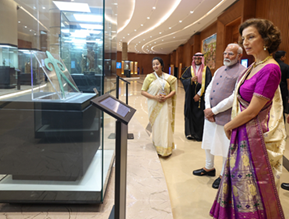In 2024, the Ministry of Culture made significant strides in preserving and promoting India’s rich heritage.
Hosting the prestigious 46th World Heritage Committee session, inscribing new sites, and launching initiatives like Project PARI marked a vibrant year for Indian culture.
Among the year’s highlights were major cultural collaborations, including a landmark agreement with the USA to combat antiquities trafficking, the development of the world’s largest museum in New Delhi, and the recognition of five new classical languages.
From global Buddhist expositions to the Har Ghar Tiranga campaign, India’s cultural and patriotic spirit soared, further reinforcing the nation’s commitment to safeguarding its diverse history for future generations.
Delhi Hosts 46th World Heritage Committee Session
One of the most significant cultural events of 2024 was the 46th session of the World Heritage Committee, held in Delhi from July 21 to 31.
Attended by nearly 2,900 delegates from over 140 countries, including UNESCO officials, Ministers of Culture, and Ambassadors, the session saw India’s “Moidams—the Mound-Burial System of the Ahom Dynasty” from Assam inscribed on the World Heritage List. This brought India’s total to 43 sites on the prestigious list.
Project PARI: Celebrating Public Art in India
Launched during the World Heritage session, Project PARI (Public Art of India) mobilized over 200 artists and 300 students to create murals, sculptures, and wall paintings across Delhi. The initiative represents a major effort to promote public art and heritage conservation.
India and USA Sign Cultural Property Agreement
A landmark Cultural Property Agreement between India and the USA was signed on July 26, 2024, to curb illicit antiquities trafficking. As part of this agreement, 297 artifacts will be repatriated from the USA to India, marking a major win in preserving India’s cultural history.
World’s Largest Museum Takes Shape in New Delhi
In New Delhi, construction of the world’s largest museum, the Yuga Yugeen Bharat Rashtriya Sangrahalaya, is underway, covering 1,55,000 square meters at Raisina Hill. Developed with support from France Museums Development, the museum will showcase India’s vast historical and cultural legacy.
Recognition of Five New Classical Languages
In October 2024, Assamese, Marathi, Pali, Prakrit, and Bengali were officially declared classical languages, bringing the total number of recognised classical languages in India to 11.
This step is expected to enhance linguistic research and global recognition.
Major Buddhist Events and Expositions
The Ministry played a key role in organizing significant Buddhist events, including the First Asian Buddhist Summit in November and a 26-day exposition of Lord Buddha’s relics in Thailand.
The relics attracted over 4 million devotees, strengthening India’s ties with its Buddhist heritage.
Indian Literary Works Gain Global Recognition
In May 2024, three iconic Indian texts—Ramcharitmanas, Panchatantra, and Sahrdayāloka-Locana—were added to UNESCO’s MOWCAP (Memory of the World Committee for Asia and the Pacific) register, highlighting India’s enduring literary legacy.
Patriotic Spirit Soars with Har Ghar Tiranga Campaign
The Har Ghar Tiranga campaign, which took place from August 9 to 15, saw over 5 crore people upload selfies with the national flag.
The initiative, supported by Tiranga runs and rallies, reignited a sense of national pride and unity across the country.
Cultural Celebrations and Museum Inaugurations
The Ministry commemorated key milestones, including the 350th anniversary of Chhatrapati Shivaji Maharaj’s coronation and the inauguration of the Humayun’s Tomb World Heritage Site Museum.
Exhibitions such as Partition Horrors Remembrance Day further emphasized the Ministry’s dedication to preserving India’s historical and cultural legacy.
Celebrating Icons of India’s Cultural and Spiritual Legacy
The 100th birth anniversaries of legendary singer Mukesh and former Bihar Chief Minister Karpoori Thakur were marked with special events, including the release of commemorative coins and stamps.
Other key events included Parakram Diwas in honour of Netaji Subhash Chandra Bose and the Global Spirituality Mahotsav in Hyderabad, which brought together spiritual leaders from various faiths.
As 2024 concluded, the Ministry of Culture stands firm in its mission to preserve, promote, and celebrate India’s diverse cultural heritage, both at home and on the global stage.














